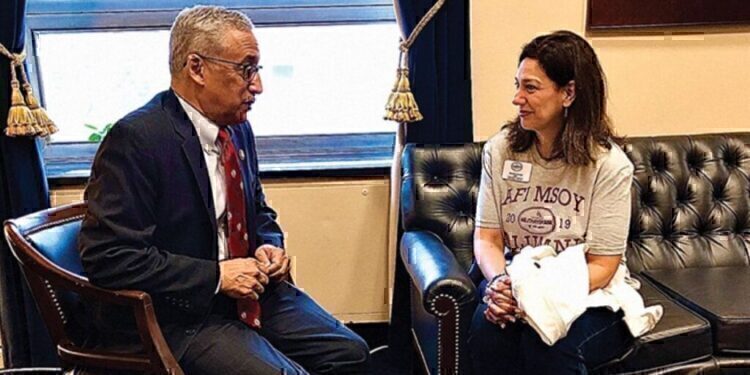See this and more inside the December issue of Military Spouse Magazine!
Navy spouse Michelle Norman is like any other mother of two. She wakes early, checks the weather and email. Reviews her calendar for the day and helps her children, Marrissa and Chase, get ready for school. After dropping her son off for in-person learning, she rushes home to help her 16-year-old daughter, who has cerebral palsy and a myriad of other learning disabilities, with virtual learning. But where Norman differs from other military parents is what she does with the rest of her day.
The former environmental engineer sits at her desk, beginning the first of many Zoom meetings while responding to emails from military spouses who need help advocating for their children with special needs. But she’s itching to make a few phone calls to our nation’s capital. She’s wanting an update on the National Defense Authorization Act 2021. This legislation is personal to her.
She’s keeping a promise to her daughter.
Norman is one of the founding members of Partners in Promise, which is an all-volunteer, not-for-profit organization whose sole focus is “protecting the rights of military children in special education through educating and advising the legislative agendas of military service organizations, Department of Defense and public officials,” according to the group’s website, thepromiseact.org.
Partners in Promise is highly focused on accountability and support for the most vulnerable in a military family. All children receiving special education are entitled to a free appropriate public education (FAPE). “We don’t want special treatment, we just want schools to follow the existing laws,” Norman said. “And we want the Department of Defense to help better support our families when they are struggling.”
Stories and statistics emerging from military families shows there are systemic problems with special education for military families across the US. Many families feel schools are “waiting them out,” which is code-speak for delaying or limiting services until the military family receives orders to move again.
Norman and her husband, Cass, are no strangers to this feeling. They’ve been highlighted in the national media for their very public and ongoing court battles with the Virginia Beach School District over the lack of support services provided to her daughter.
Norman, along with other founders Grace Kim, Shannon DeBlock and Kaci McFarley, wrote and lobbied for specific legislation addressing military children with special needs called the PROMISE Act (Protect the Rights Of Military Children in Special Education). All four members are military spouses who have a child with special needs.
The PROMISE Act Initiatives were incorporated in the recently introduced draft legislation bills H.R. 6395 and S. 4049 for the NDAA 2021.
Jennifer Barnhill, chief communication officer at Partners in Promise, is helping to bring the organization to the national stage. As a military spouse, she brings a different perspective as a mother of children who are not special needs. She volunteers her time to Partners in Promise because she believes this is a fight for all military families. “Even though it’s not our struggle, it’s our community’s struggle.”
Barnhill wants to help military families understand their rights and advocate for their child when appropriate. “We know parents are the best advocate for their children. Through the PROMISE Act and our latest Military Special Education Survey, we hope to obtain stories from the homefront that are often overlooked and data that our legislators and military leaders can use to help improve programming and legal protections for our families.”
There are seven major initiatives in the Promise Act, but here are a few highlights:
- Collect data on military family disputes, number of disputes compared to civilians, and accessibility barriers to dispute resolution processes, high risk school districts, sufficiency of federal funding, oversight and accountability to ensure school districts provide Free Appropriate Public Education (FAPE).
- Allow families to maintain their child’s current Individualized Educational Plan (IEP) for at least six months after arrival at a new duty station before any changes are made.
- Direct states to document parental consent before any IEP changes can be implemented for military children.
- The to-do list is long for Partners in Promise. Barnhill is hopeful. “My goal is in five years from now, we have to do less advocating.”
- After a long day of parenting and advocating for military families, Norman ends her night on the couch with tight snuggles from her children watching “Jeopardy” on Netflix. She’s parenting solo again; her husband is deployed once more. With endless energy and grit, she’ll get up tomorrow and continue to work the phones. When she looks at her daughter’s beautiful contagious wide smile, she says it’s easy to continue to fight.
- Norman is keeping her promise.
__
Images:
Michelle Norman speaks with Matthew Cardenas, a staff member for U.S. Rep. McMorris Rodgers.
Michelle Norman talks with U.S. Rep. Bobby Scott, chairman of the House Committee on Education and Labor, about the Congressional Military Families Caucus Summit.









